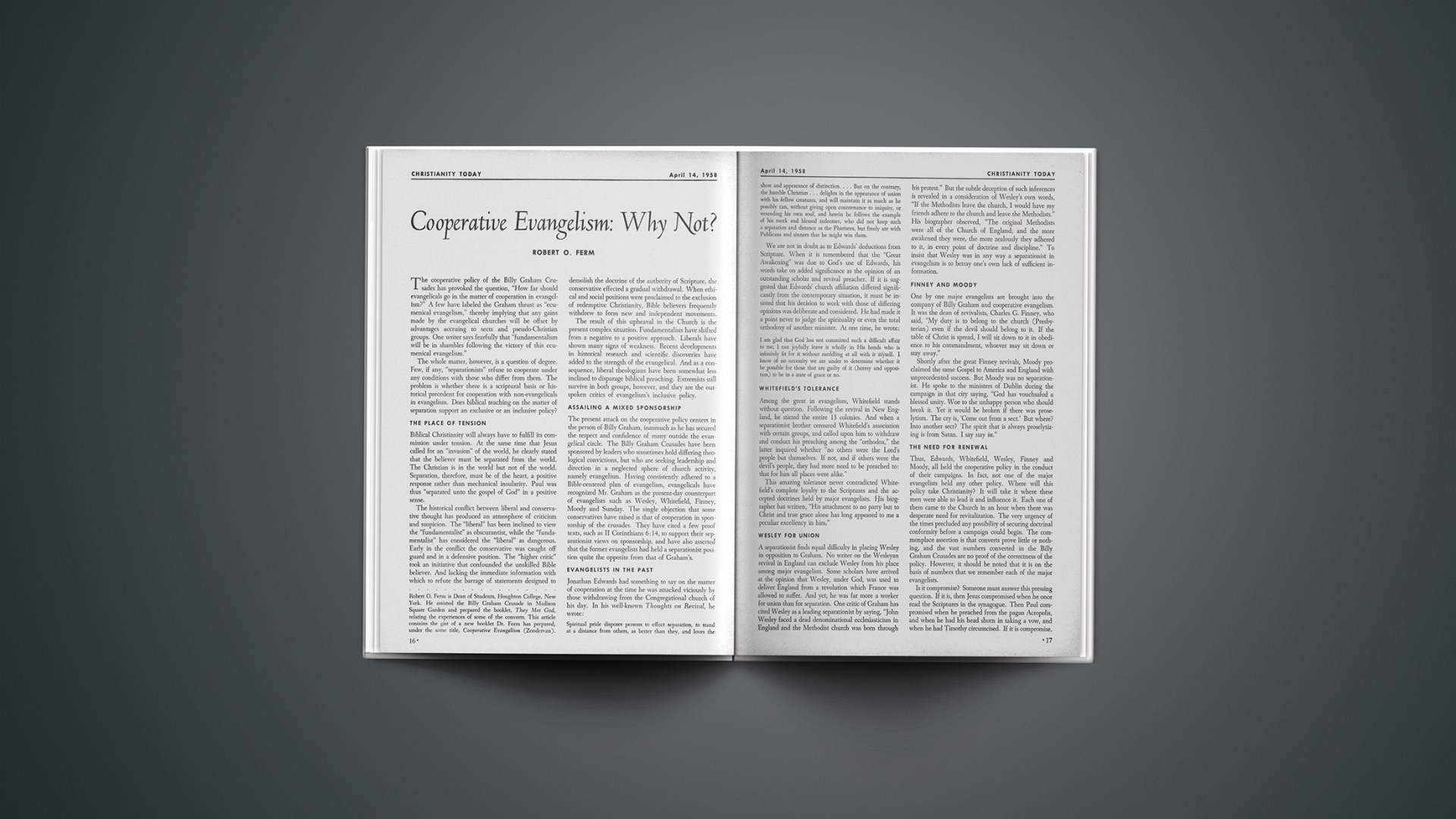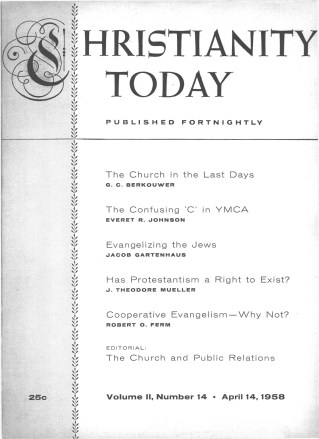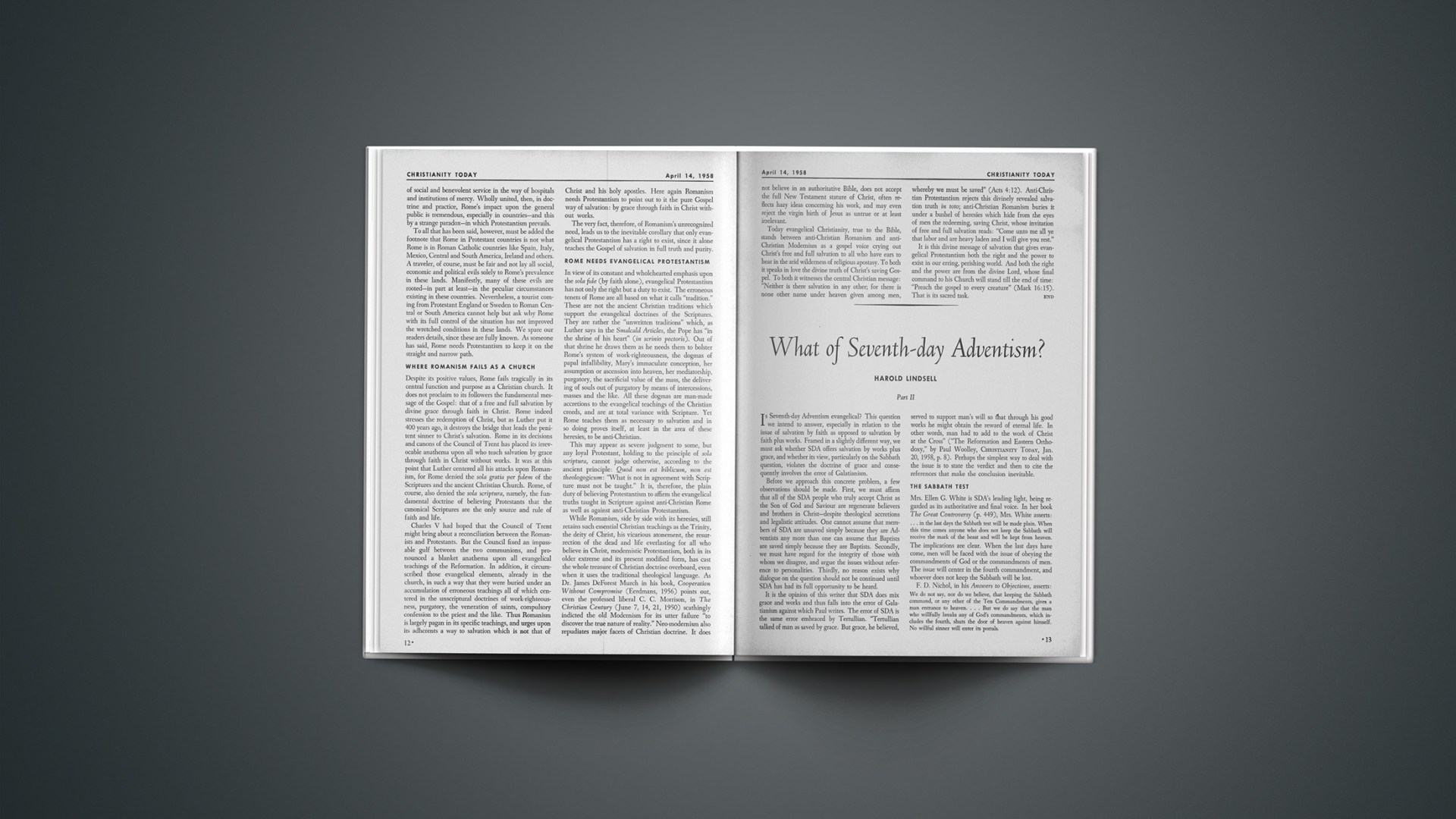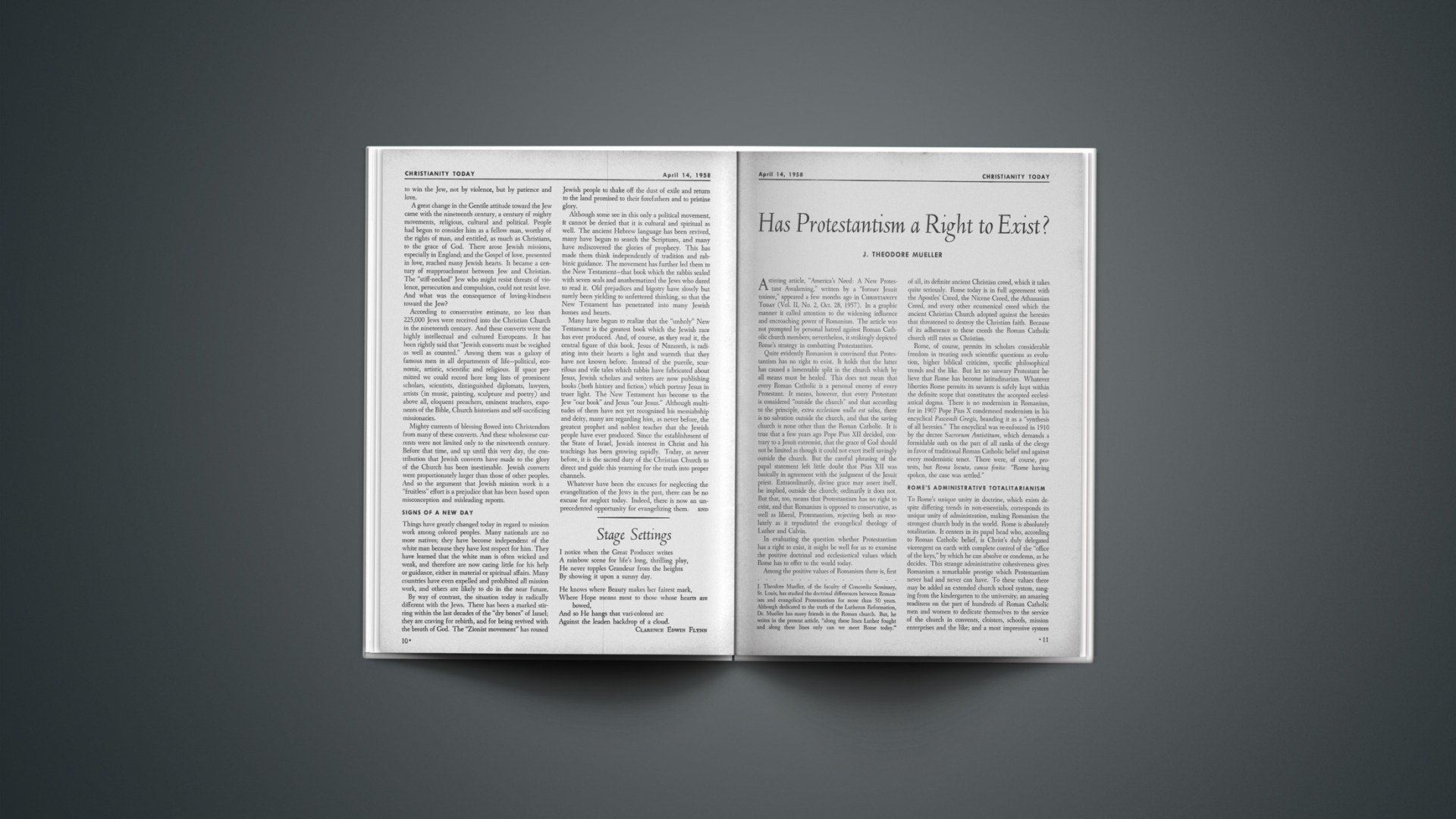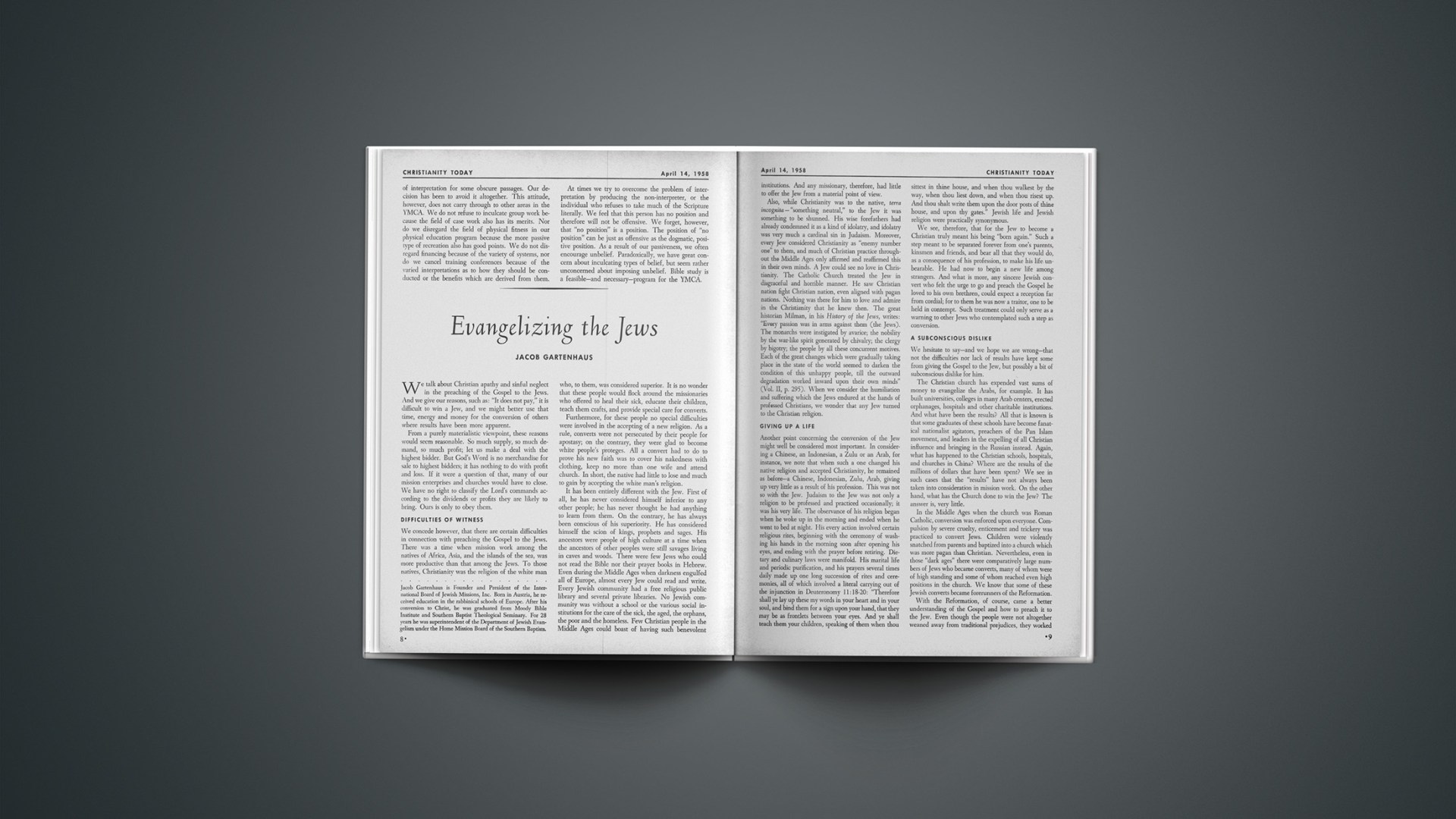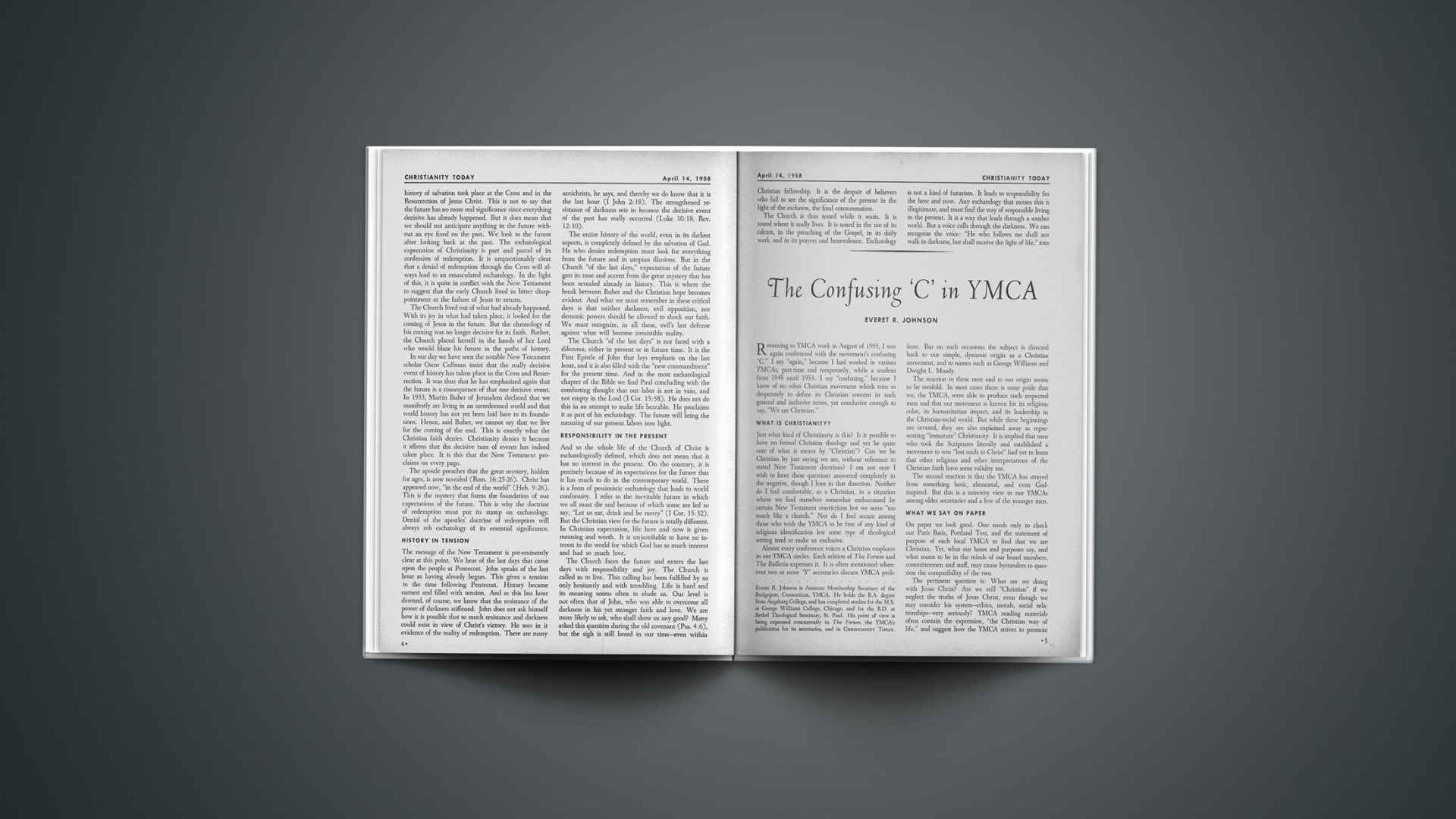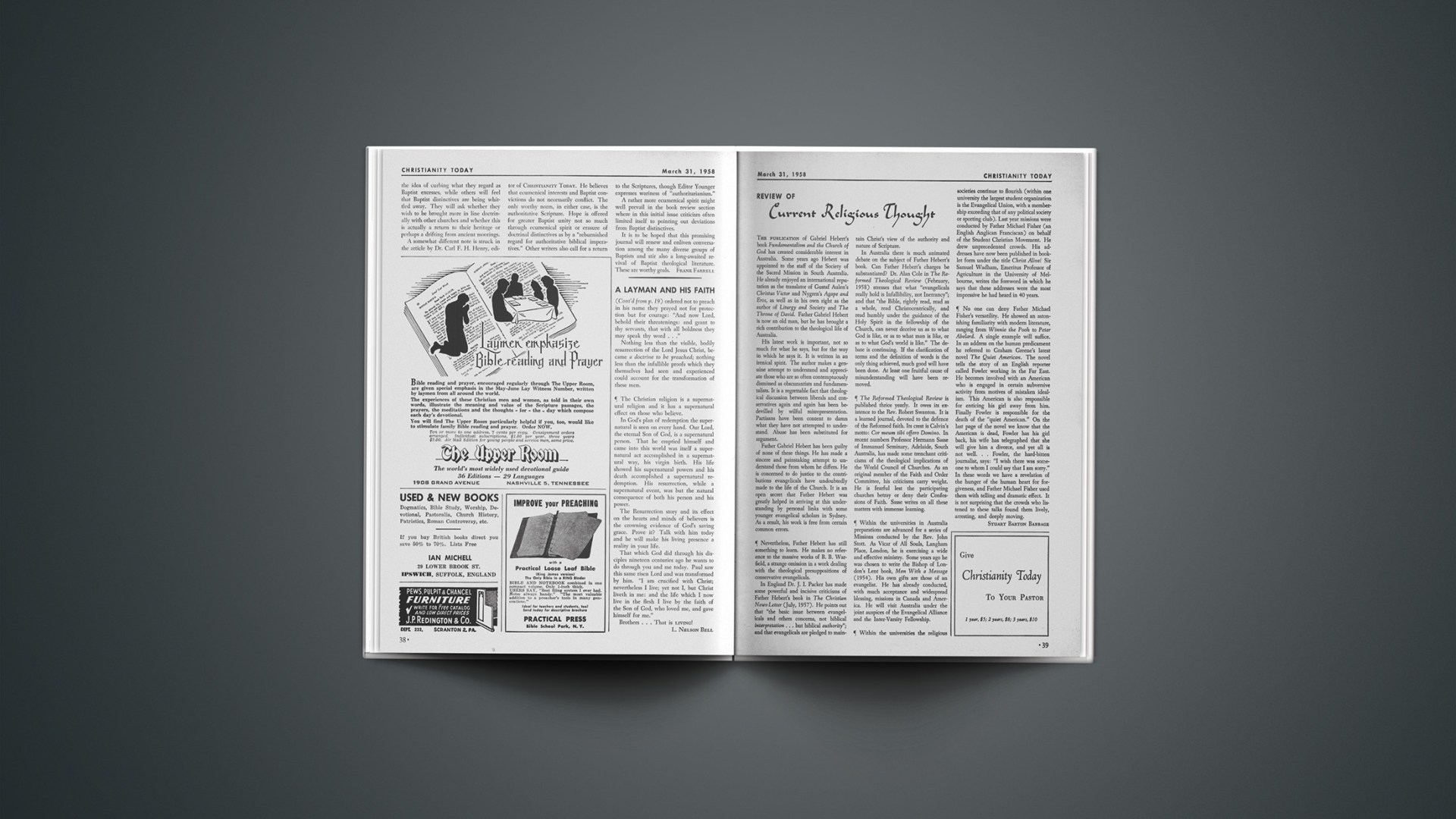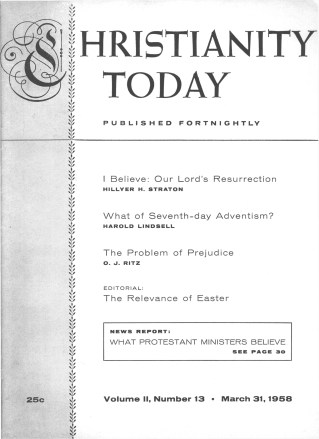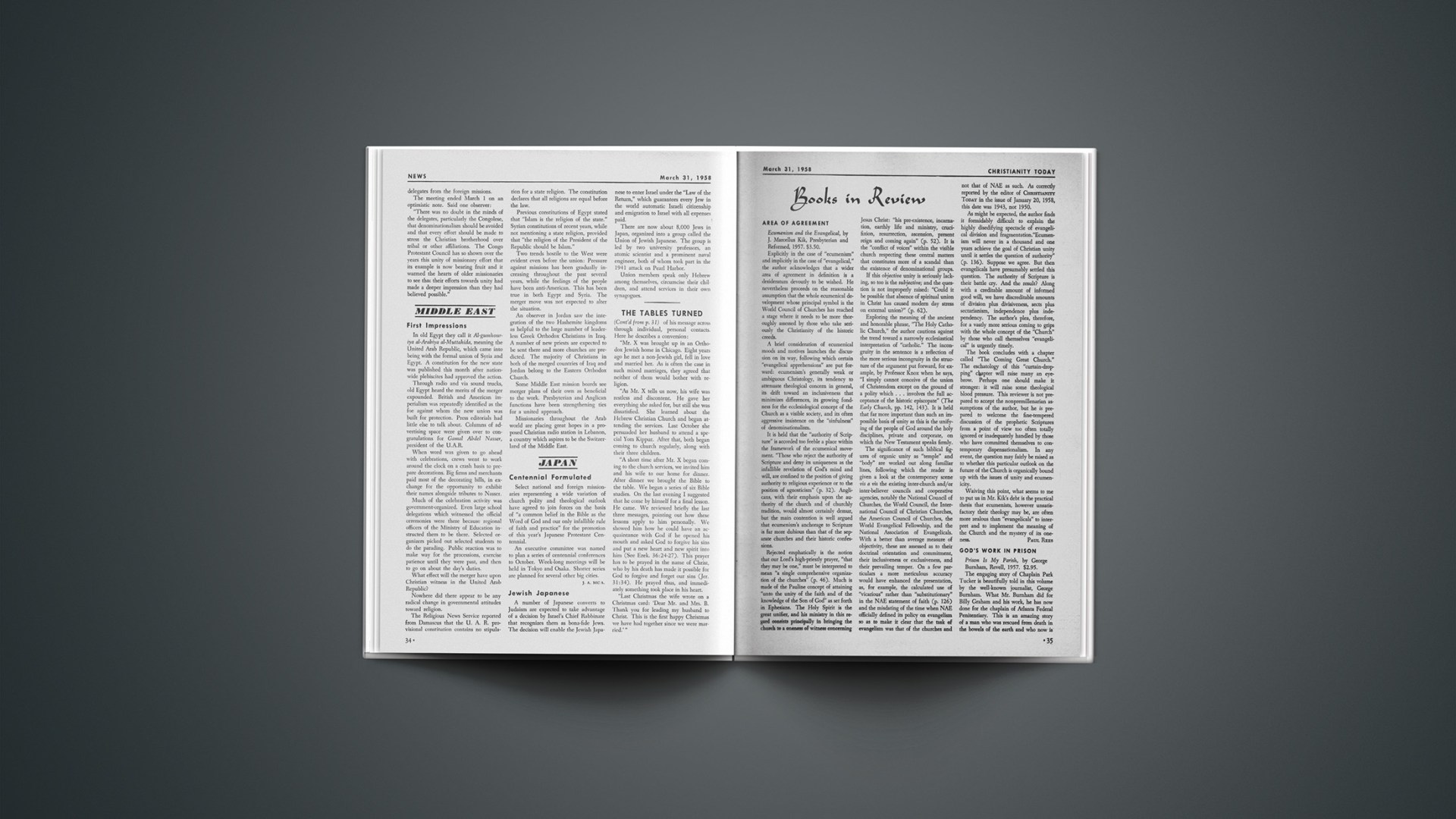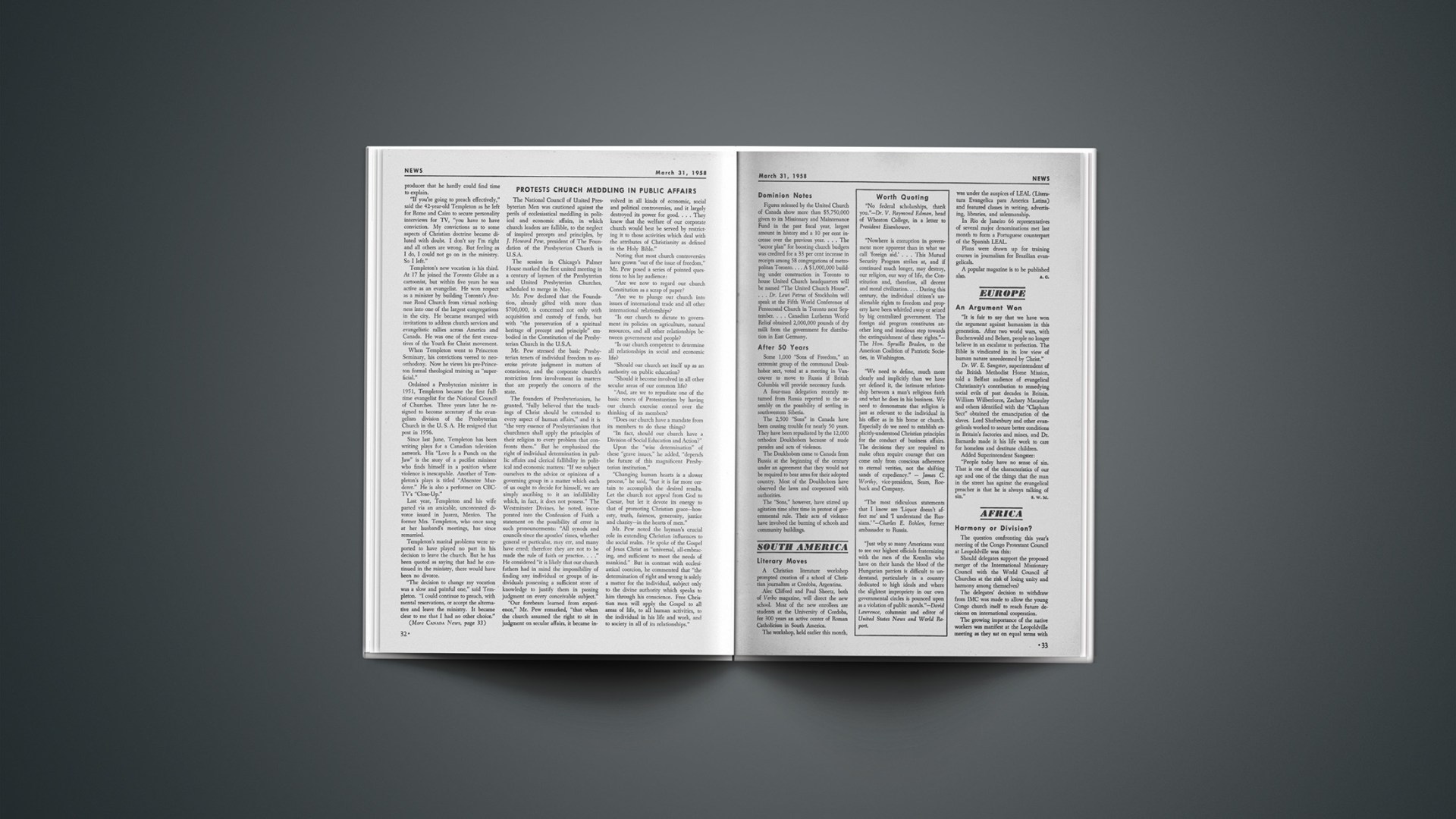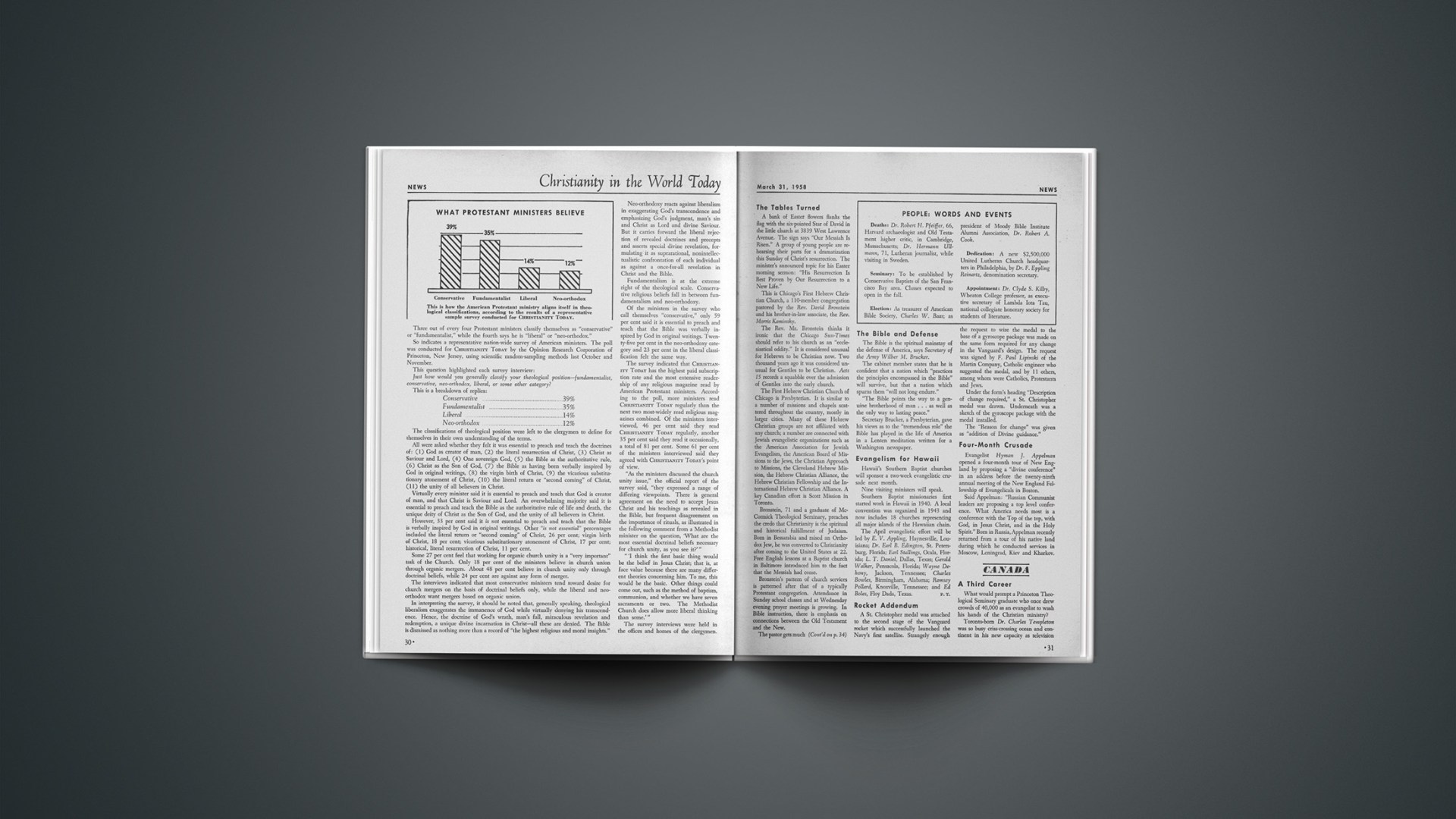The cooperative policy of the Billy Graham Crusades has provoked the question, “How far should evangelicals go in the matter of cooperation in evangelism?” A few have labeled the Graham thrust as “ecumenical evangelism,” thereby implying that any gains made by the evangelical churches will be offset by advantages accruing to sects and pseudo-Christian groups. One writer says fearfully that “fundamentalism will be in shambles following the victory of this ecumenical evangelism.”
The whole matter, however, is a question of degree. Few, if any, “separationists” refuse to cooperate under any conditions with those who differ from them. The problem is whether there is a scriptural basis or historical precedent for cooperation with non-evangelicals in evangelism. Does biblical teaching on the matter of separation support an exclusive or an inclusive policy?
The Place Of Tension
Biblical Christianity will always have to fulfill its commission under tension. At the same time that Jesus called for an “invasion” of the world, he clearly stated that the believer must be separated from the world. The Christian is in the world but not of the world. Separation, therefore, must be of the heart, a positive response rather than mechanical insularity. Paul was thus “separated unto the gospel of God” in a positive sense.
The historical conflict between liberal and conservative thought has produced an atmosphere of criticism and suspicion. The “liberal” has been inclined to view the “fundamentalist” as obscurantist, while the “fundamentalist” has considered the “liberal” as dangerous. Early in the conflict the conservative was caught off guard and in a defensive position. The “higher critic” took an initiative that confounded the unskilled Bible believer. And lacking the immediate information with which to refute the barrage of statements designed to demolish the doctrine of the authority of Scripture, the conservative effected a gradual withdrawal. When ethical and social positions were proclaimed to the exclusion of redemptive Christianity, Bible believers frequently withdrew to form new and independent movements.
The result of this upheaval in the Church is the present complex situation. Fundamentalists have shifted from a negative to a positive approach. Liberals have shown many signs of weakness. Recent developments in historical research and scientific discoveries have added to the strength of the evangelical. And as a consequence, liberal theologians have been somewhat less inclined to disparage biblical preaching. Extremists still survive in both groups, however, and they are the outspoken critics of evangelism’s inclusive policy.
Assailing A Mixed Sponsorship
The present attack on the cooperative policy centers in the person of Billy Graham, inasmuch as he has secured the respect and confidence of many outside the evangelical circle. The Billy Graham Crusades have been sponsored by leaders who sometimes hold differing theological convictions, but who are seeking leadership and direction in a neglected sphere of church activity, namely evangelism. Having consistently adhered to a Bible-centered plan of evangelism, evangelicals have recognized Mr. Graham as the present-day counterpart of evangelists such as Wesley, Whitefield, Finney, Moody and Sunday. The single objection that some conservatives have raised is that of cooperation in sponsorship of the crusades. They have cited a few proof texts, such as 2 Corinthians 6:14, to support their separationist views on sponsorship, and have also asserted that the former evangelists had held a separationist position quite the opposite from that of Graham’s.
Evangelists In The Past
Jonathan Edwards had something to say on the matter of cooperation at the time he was attacked viciously by those withdrawing from the Congregational church of his day. In his well-known Thoughts on Revival, he wrote:
Spiritual pride disposes persons to effect separation, to stand at a distance from others, as better than they, and loves the show and appearance of distinction.… But on the contrary, the humble Christian … delights in the appearance of union with his fellow creatures, and will maintain it as much as he possibly can, without giving open countenance to iniquity, or wounding his own soul, and herein he follows the example of his meek and blessed redeemer, who did not keep such a separation and distance as the Pharisees, but freely ate with Publicans and sinners that he might win them.
We are not in doubt as to Edwards’ deductions from Scripture. When it is remembered that the “Great Awakening” was due to God’s use of Edwards, his words take on added significance as the opinion of an outstanding scholar and revival preacher. If it is suggested that Edwards’ church affiliation differed significantly from the contemporary situation, it must be insisted that his decision to work with those of differing opinions was deliberate and considered. He had made it a point never to judge the spirituality or even the total orthodoxy of another minister. At one time, he wrote:
I am glad that God has not committed such a difficult affair to me; I can joyfully leave it wholly in His hands who is infinitely fit for it without meddling at all with it myself. I know of no necessity we are under to determine whether it be possible for those that are guilty of it (heresy and opposition) to be in a state of grace or no.
Whitefield’S Tolerance
Among the great in evangelism, Whitefield stands without question. Following the revival in New England, he stirred the entire 13 colonies. And when a separationist brother censured Whitefield’s association with certain groups, and called upon him to withdraw and conduct his preaching among the “orthodox,” the latter inquired whether “no others were the Lord’s people but themselves. If not, and if others were the devil’s people, they had more need to be preached to: that for him all places were alike.”
This amazing tolerance never contradicted Whitefield’s complete loyalty to the Scriptures and the accepted doctrines held by major evangelists. His biographer has written, “His attachment to no party but to Christ and true grace alone has long appeared to me a peculiar excellency in him.”
Wesley For Union
A separationist finds equal difficulty in placing Wesley in opposition to Graham. No writer on the Wesleyan revival in England can exclude Wesley from his place among major evangelists. Some scholars have arrived at the opinion that Wesley, under God, was used to deliver England from a revolution which France was allowed to suffer. And yet, he was far more a worker for union than for separation. One critic of Graham has cited Wesley as a leading separationist by saying, “John Wesley faced a dead denominational ecclesiasticism in England and the Methodist church was born through his protest.” But the subtle deception of such inferences is revealed in a consideration of Wesley’s own words, “If the Methodists leave the church, I would have my friends adhere to the church and leave the Methodists.” His biographer observed, “The original Methodists were all of the Church of England; and the more awakened they were, the more zealously they adhered to it, in every point of doctrine and discipline.” To insist that Wesley was in any way a separationist in evangelism is to betray one’s own lack of sufficient information.
Finney And Moody
One by one major evangelists are brought into the company of Billy Graham and cooperative evangelism. It was the dean of revivalists, Charles G. Finney, who said, “My duty is to belong to the church (Presbyterian) even if the devil should belong to it. If the table of Christ is spread, I will sit down to it in obedience to his commandment, whoever may sit down or stay away.”
Shortly after the great Finney revivals, Moody proclaimed the same Gospel to America and England with unprecedented success. But Moody was no separationist. He spoke to the ministers of Dublin during the campaign in that city saying, “God has vouchsafed a blessed unity. Woe to the unhappy person who should break it. Yet it would be broken if there was proselytism. The cry is, ‘Come out from a sect.’ But where? Into another sect? The spirit that is always proselytizing is from Satan. I say stay in.”
The Need For Renewal
Thus, Edwards, Whitefield, Wesley, Finney and Moody, all held the cooperative policy in the conduct of their campaigns. In fact, not one of the major evangelists held any other policy. Where will this policy take Christianity? It will take it where these men were able to lead it and influence it. Each one of them came to the Church in an hour when there was desperate need for revitalization. The very urgency of the times precluded any possibility of securing doctrinal conformity before a campaign could begin. The commonplace assertion is that converts prove little or nothing, and the vast numbers converted in the Billy Graham Crusades are no proof of the correctness of the policy. However, it should be noted that it is on the basis of numbers that we remember each of the major evangelists.
Is it compromise? Someone must answer this pressing question. If it is, then Jesus compromised when he once read the Scriptures in the synagogue. Then Paul compromised when he preached from the pagan Acropolis, and when he had his head shorn in taking a vow, and when he had Timothy circumcised. If it is compromise, then Wesley compromised when he remained loyal to the Church of England and forbade his friends to leave it, and Whitefield compromised when he forsook the conservative groups of Scotland to preach to an unorthodox group. If it is compromise, then Finney compromised when he pressed clergymen like Hawes and Bushnell to support his New York meeting, and Moody compromised when he employed Drummond as a worker among young students.
The Limits Of The Gospel
What are the limits of cooperation? The evangelist is limited in his preaching, of course; for the Gospel must forever be the message of the Cross and the Resurrection. He must proclaim the grace of God so clearly that personal conversion will result. He can by no means imply that vital doctrines are nonessential. He is limited in his commitments, and he cannot allow himself to become obligated by any contract that places him at a disadvantage. The sponsors are his hosts, but never his directors.
These are the negative limits. What are the positive? The most characteristic function of the Church is to evangelize. The evangelist is driven by an inner compulsion to bear the message wherever and to whomever he can. There is a recklessness about his method; he storms the gates of hell when called upon to do so. But by virtue of his very calling, he must not remain within the safety of the fold of believers.
Come
Unspeaking, one by one they rise
And leave the room—
The loved with whom we sat
At friendship’s eager meet
Through golden years.
We who remain behold
The pushed back, empty chairs;
And sense the rising summons that
Shall draw us singly too, ere long,
To leave the waning feast
And gain the selfsame door.
A growing music seems to float
Thereout at every opening.
Familiar voices chime.
And over them there breathes
A nobler, sweetly glorious,
Divine, majestic Voice
Exclaiming, “Come!”
ROLLIN O. EVERHART
Robert O. Ferm is Dean of Students, Houghton College, New York. He assisted the Billy Graham Crusade in Madison Square Garden and prepared the booklet, They Met God, relating the experiences of some of the converts. This article contains the gist of a new booklet Dr. Ferm has prepared, under the same title, Cooperative Evangelism (Zondervan).

